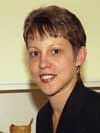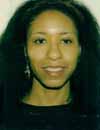TC's 2002-2003 Minority Postdoctoral Fellows
Rosalie Rolón-Dow
Having just finished her Ph.D. at Temple University, Rosalie Rolón-Dow arrived at TC this fall as a Minority Postdoctoral Fellow working with the Department of Curriculum and Teaching. She will be working on research similar in nature to her dissertation study, looking to publish some of her material, and teaching a class in the spring.
Rolón-Dow spent time as a bilingual elementary school teacher in urban schools and became curious about the experience of Puerto Rican students in urban schools, specifically looking at how educational inequality is structured and why it is structured along ethnic and class lines. That, in essence, is what she looked at in her dissertation, Schooling Matters: A Contextual Exploration of Engagement, Identity, and Ideology in the Educational Journeys of Puerto Rican Girls.
Following a group of Philadelphia middle school girls in their 7th and 8th grade years, Rolón-Dow wanted to capture their daily schooling experiences through observations, home visits, and interviews with the students, parents, and teachers to determine how their identity characteristics and school experiences overlapped to influence their ability and desire to become more engaged in the schooling process.
Rolon-Dow illustrated how day to day school practices, relationships within the school, and beliefs about success and failure can shape the ways that Puerto Rican girls engage in school.
She found that relationships between teachers and Puerto Rican girls and their perceptions of each other were influenced by ethnicity, gender and class. "There was a lot of distance because of those differences," she said. The Puerto Rican girls in her study did not believe that their teachers knew them well or cared for them, while many teachers believed that neither the students' families nor the community cared about education. These beliefs influenced the type of engagement that the girls exhibited in school.
"The other way that I describe it is that identity matters," Rolón-Dow explained. "It matters in perceptions individuals have of each other and how identity is constructed at school. I looked specifically at how identity characteristics intersect and which identity characteristics are validated or created."
At TC, she would like to follow up with the girls from her dissertation study, who are now sophomores in high school, to see how their educational experiences have continued to develop over time. She hopes to do field work in New York City public schools and in the spring she hopes to develop a course out of her own area of interest, possibly on urban girls or the education of Latino students.
Rolón-Dow received her B.A. in Elementary and Middle Education at Eastern Mennonite University in Harrisonburg, Virginia, and her M.Ed. and Ph.D. in Urban Education from Temple University in Philadelphia. She also received an AERA Dissertation Fellowship and a Ford Foundation Dissertation Completion Fellowship for Minorities.
Trica Keaton
After receiving her Ph.D. in 2001 from University of California, Berkeley, Trica Keaton was selected as a Non-resident Fellow at The W.E.B. Du Bois Institute, Harvard University, where she conducted research on contemporary immigrants and on the distinguished African American educator, Dr. Anna Julia Cooper (1859-1964). She joined Teachers College this fall as a Minority Postdoctoral Fellow while continuing her Fellowship with the Du Bois Institute.
Fellowships for Keaton have been numerous and varied. Keaton originally intended to be a French major. She received her BA from UCLA in Linguistics and French, followed by two MA degrees-one from Middlebury College in French, focusing on literature and language and one from UCLA in Applied Linguistics with an emphasis on language policy.
"Early in my academic career, I wanted to obtain a Ph.D. in French so that I could gain greater insights into North and West African cultures through the lens of the humanities," Keaton explained. "As I became more involved in exploring educational issues and seeing the barriers that excluded young people of those origins in France, it became apparent to me that my heart was more in the social sciences. Pursuing a Ph.D. in education has allowed me to combine all of my interests while permitting me to explore the theoretical world where these issues are defined and the practical world of schools and lived experiences where I could put a human face on those critical questions and concerns."
Keaton's research focused on Muslim girls in France in the outer cities of Paris. "I was curious, when I first went to France, about this irony that I was accepted as an African American while those of African descent who were living in France were treated with such disdain."
Her dissertation research and a forthcoming book, Beings Perceived: Muslim Girls in French Schools and Society, conceptually inspired by Pierre Bourdieu, look at her findings based on a multi-year ethnography.
Through personal observation and interviews in the schools, neighborhoods, homes and communities near Paris, Keaton confronted the educational dilemmas faced by such young people and their families in France, families whose experience of migration transformed into immigration. As she soon discovered, similar issues faced by immigrants in the United States existed for those whom she came to know-linguistic issues, ability, tracking-yet the children Keaton got to know also had to deal with cultural and religious issues.
"In France, the educational system is highly secular," she explained. "For example, girls wearing a head scarf were readily expelled because of the national educational policy that is structured by French secularism. Any sign of ostentatious religious affiliation, like a veil, is not allowed in the schools or on school grounds."
"Based on this research, I became interested in a similar phenomenon in the US with similar populations." As a result of the 1965 shift in immigration policy that eliminated some of the national origin restrictions that had been in place, immigrants from places like Central America, Mexico, various nations in Africa and Asia entered the US in great numbers. "We now have a significant second-plus generation in US urban schools," Keaton said.
Her Fellowship research at TC will look at specific groups in New York City to find what "bridges and barriers to learning" they experience, as well as what it means to them to be an American.
Keaton also hopes to teach a course in the spring in the Department of International and Transcultural Studies.
Published Monday, Feb. 24, 2003

